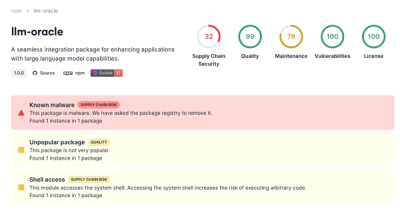
Security News
Dutch National Police Disrupt Redline and Meta Malware Operations
Dutch National Police and FBI dismantle Redline and Meta infostealer malware-as-a-service operations in Operation Magnus, seizing servers and source code.
@serverless/platform-client
Advanced tools
This light-weight SDK is designed to be used anywhere (CLI, Front-End, Back-End Services, etc.) and make it easy to interact with the Serverless Platform and perform operations on it. It's really just a wrapper around the Serverless Platform Services, wi
@serverless/platform-client is an npm package that provides a client for interacting with the Serverless Platform. It allows users to manage and deploy serverless applications, interact with the Serverless Framework Dashboard, and access various services provided by the Serverless Platform.
Initialize the client
This code initializes the Serverless SDK client, which is the starting point for interacting with the Serverless Platform.
const { ServerlessSDK } = require('@serverless/platform-client');
const sdk = new ServerlessSDK();Login to the Serverless Platform
This code demonstrates how to log in to the Serverless Platform using the SDK. This is necessary for performing authenticated operations.
const { ServerlessSDK } = require('@serverless/platform-client');
const sdk = new ServerlessSDK();
(async () => {
await sdk.login();
})();Deploy a service
This code demonstrates how to deploy a service to the Serverless Platform. It requires the user to be logged in and provides details about the organization, application, service, and stage.
const { ServerlessSDK } = require('@serverless/platform-client');
const sdk = new ServerlessSDK();
(async () => {
await sdk.login();
const result = await sdk.deploy({
orgName: 'your-org',
appName: 'your-app',
serviceName: 'your-service',
stageName: 'dev',
inputs: {}
});
console.log(result);
})();List services
This code demonstrates how to list all services within a specific organization. It requires the user to be logged in and provides the organization name.
const { ServerlessSDK } = require('@serverless/platform-client');
const sdk = new ServerlessSDK();
(async () => {
await sdk.login();
const services = await sdk.listServices({ orgName: 'your-org' });
console.log(services);
})();The AWS SDK for JavaScript provides a comprehensive set of tools for interacting with AWS services. It is more general-purpose compared to @serverless/platform-client, which is specifically designed for the Serverless Platform. The AWS SDK supports a wide range of AWS services and is suitable for users who need to interact with AWS directly.
The Google Cloud Client Library for Node.js provides tools for interacting with Google Cloud services. Similar to the AWS SDK, it is more general-purpose and supports a wide range of Google Cloud services. It is suitable for users who need to interact with Google Cloud directly, whereas @serverless/platform-client is focused on the Serverless Platform.
The Azure SDK for JavaScript provides tools for interacting with Azure services. It is a comprehensive library for managing Azure resources and services. Like the AWS and Google Cloud SDKs, it is more general-purpose and supports a wide range of Azure services, while @serverless/platform-client is focused on the Serverless Platform.
This light-weight SDK is designed to be used anywhere (CLI, Front-End, Back-End Services, etc.) and make it easy to interact with the Serverless Platform and perform operations on it. It's really just a wrapper around the Serverless Platform Services, with great documentation so that you can better understand how its APIs work.
Install the Serverless Platform Client SDK via NPM.
npm i @serverless/platform-client
If you are working with the dev environment of the Serverless Platform, set the following environment variable, or configure the client programmatically, as detailed below.
export SERVERLESS_PLATFORM_STAGE=dev
Here is how you require, instantiate the Client and use it:
const { ServerlessClient } = require('@serverless/platform-client')
client = new ServerlessClient({
platformStage: 'dev', // Optional. Defaults to 'prod'
accessKey: 'JA98JAJFASLFJSALFJASLFJ', // Optional, but recommended. Platform Access Key needed to identify all requests.
})
const instances = await client.listInstances('my-org')
The Serverless Platform Client SDK Class
Kind: global class
nullstringnullnullbooleannullobjectAccepts a configuration block. See the config() method for more information.
| Param | Type |
|---|---|
| config | object |
nullUpdates the SDK configuration
Kind: instance method of ServerlessClient
| Param | Type | Description |
|---|---|---|
| config.accessKey | object | Can either be a Serverless Platform Access Key or an ID Token. |
| config.platformStage | object | The Serverless Platform Stage you wish to interact with. |
stringGets a domain for a specific service: "engine", "registry", "events-streaming"
Kind: instance method of ServerlessClient
Returns: string - The domain of that service.
| Param | Type | Default | Description |
|---|---|---|---|
| serviceName | string | null | The name of the Serverless Platform Service you want the domain for. |
nullEstablishes a websockets connection with the Serverless Platform
Kind: instance method of ServerlessClient
| Param | Type | Description |
|---|---|---|
| options.org | string | Name of the Serverless Platform Org. |
| options.onEvent | function | A function that handles events recieved from the Serverless Platform |
| options.filter | function | Filters which events this connection should receive |
nullDisconnects a websockets connection with the Serverless Platform
Kind: instance method of ServerlessClient
booleanChecks if the SDK is currently connected to the Serverless Platform
Kind: instance method of ServerlessClient
Returns: boolean - Will return true if the websocket connection is active.
nullPublishes a Serverless Platform Event
Kind: instance method of ServerlessClient
objectGet Component
Kind: instance method of ServerlessClient
Returns: object - Returns a Component definition from the Registry.
| Param | Type | Default | Description |
|---|---|---|---|
| componentName | * | | The name of the Component within the Registry. |
| componentVersion | * | | The version of a specific Component within the Registry. If this is not included, this method will always return the latest version. |
Pre-Publish Component
Kind: instance method of ServerlessClient
| Param | Type | Description |
|---|---|---|
| orgName | * | // Optional. Must include either orgName or orgUid. |
| orgUid | * | // Optional. Must include either orgName or orgUid. |
| componentDefinition | * | // serverless.component.yml |
Get Instance
Kind: instance method of ServerlessClient
| Param | Type | Default | Description |
|---|---|---|---|
| orgName | * | | Optional. Must include either orgName or orgUid. |
| orgUid | * | | Optional. Must include either orgName or orgUid. |
| appName | * | | Required. The name of the Application the Instance is within. |
| stageName | * | | Required. The name of the Stage the Instance is within. |
| instanceName | * | | Required. The name of the Instance. |
List all Component Instances within an Org, given an org name or org UId
Kind: instance method of ServerlessClient
| Param | Type | Default | Description |
|---|---|---|---|
| orgName | * | | Optional. Must include either orgName or orgUid. |
| orgUid | * | | Optional. Must include either orgName or orgUid. |
Save Instance
Kind: instance method of ServerlessClient
| Param | Type | Description |
|---|---|---|
| instance | object | An object representing your Instance definition. |
Get the upload URLs needed to upload source code before an Instance is run.
Kind: instance method of ServerlessClient
| Param | Type | Default | Description |
|---|---|---|---|
| orgName | * | | Optional. Must include either orgName or orgUid. |
| orgUid | * | | Optional. Must include either orgName or orgUid. |
Run a method of an Instance (e.g. 'deploy', 'remove', etc.)
Kind: instance method of ServerlessClient
| Param | Type | Description |
|---|---|---|
| data.instance | object | The Instance definition. |
| data.method | string | The method you wish to run on the Instance (e.g. deploy, remove). |
| data.credentials | object | The credentials of the cloud providers required by the Instance. |
| data.options | object | Any options you wish to supply the Instance method. |
| data.size | number | The size in bytes of the source code, so that the Instance method can validate it beforehand. |
Run a method of an Instance (e.g. 'deploy', 'remove', etc.)
Kind: instance method of ServerlessClient
| Param | Type | Description |
|---|---|---|
| data.instance | object | The Instance definition. |
| data.method | string | The method you wish to run on the Instance (e.g. deploy, remove). |
| data.credentials | object | The credentials of the cloud providers required by the Instance. |
| data.options | object | Any options you wish to supply the Instance method. |
| data.size | number | The size in bytes of the source code, so that the Instance method can validate it beforehand. |
Before publishing the client, be sure to update it's documentation by running: npm run docs within the client folder.
The reason this is kept in a separate library is because this SDK needs to be extremely light-weight, since it is used in back-end services built on AWS Lambda, as well as packaged into the Lambda Layer that is included within every Component Function in the Serverless Registry. The original Platform SDK contains many heavy NPM dependencies, increasing the overall package size, and slowing down the performance of any Lambda functions that use it.
© Serverless Inc.
FAQs
This Serverless Platform SDK makes it easy to interact with the Serverless Platform and perform operations on it. Please note that there is an existing `@serverless/platform-sdk` npm module for interacting with the Serverless Inc. SaaS original platform s
The npm package @serverless/platform-client receives a total of 779,536 weekly downloads. As such, @serverless/platform-client popularity was classified as popular.
We found that @serverless/platform-client demonstrated a healthy version release cadence and project activity because the last version was released less than a year ago. It has 3 open source maintainers collaborating on the project.
Did you know?

Socket for GitHub automatically highlights issues in each pull request and monitors the health of all your open source dependencies. Discover the contents of your packages and block harmful activity before you install or update your dependencies.

Security News
Dutch National Police and FBI dismantle Redline and Meta infostealer malware-as-a-service operations in Operation Magnus, seizing servers and source code.

Research
Security News
Socket is tracking a new trend where malicious actors are now exploiting the popularity of LLM research to spread malware through seemingly useful open source packages.

Security News
Research
Noxia, a new dark web bulletproof host, offers dirt cheap servers for Python, Node.js, Go, and Rust, enabling cybercriminals to distribute malware and execute supply chain attacks.